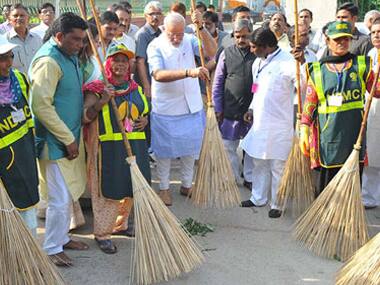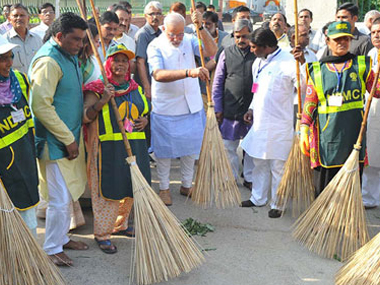When Prime Minister Narendra Modi formed the government at the Centre, one of his pet initiatives that took off with much media coverage and fanfare was the Swachh Bharat campaign or the Clean India campaign. The campaign was aimed at covering 4,041 statutory towns, and cleaning the streets, roads and infrastructure of the country. On 2 October, it will have been a year since the campaign was launched and according to this report in The Indian Express
, the campaign has taken a ‘backseat.’ An
opinion poll
in Gurgaon found out that nearly two-thirds of the residents surveyed felt there was no impact of the campaign on the city or their surroundings. Conducted by
LocalCircles,
the poll found out that 64 percent of the residents felt there has been ’no impact’ of the cleanliness mission on the city while 12 percent said the state of sanitation was worse than before. Only 24 percent felt the city has become ‘somewhat cleaner’ since the drive was launched. [caption id=“attachment_2447970” align=“alignleft” width=“380”]
 PTI image.[/caption] The survey was conducted in more than 100 cities in which, more than 3,35,000 citizens were interviewed. The sample size in each city was more than 30,000 people, The Times of India
reported. The poll was conducted over a period of nearly one year, starting right after the drive was launched last year. Somewhat expectedly, in the government’s own rankings, Gurgaon ranked 466th among 476 cities. According to the report in The Indian Express,
New Delhi Municipal Council (NDMC) offcials expressed their helplessness at the state of things. The officials told the newspaper that it was hard to keep the _paan-_stained walls clean even after a anti-spitting drive was launched by BJP MP and NDMC member Meenakshi Lekhi. “It was a part of the Swachh Bharat drive. Under this, it was decided that those caught spitting will have to pay a fine of up to Rs 100. The council had planned to put in place a team of marshals for this purpose. The initiative, however, does not seem to have been effective,” a senior NDMC official was quoted as saying. But the fact remains that the government alone cannot bring about much change unless the people clean their surroundings and keep the streets spick and span. In fact,
despite several measures taken by the government,
there have been no visible changes. “It is all about attitude. No amount of fines or challans can change it. We need to launch more drives to encouraging them to keep public places clean,” Lekhi was quoted as saying. As Anjani Chikersal of The Wire
argues in this piece, the Swachh Bharat Abhiyaan was created on the premise that people are dirty, and defecate in the open even when they don’t have to. “It claims that once toilets are provided, and the behaviour of Indians has been modified, all sanitation problems will be solved. India will become clean and consequently healthy. What the SBM does is to equate poor sanitation with open defecation, and lay the blame for this, not so subtly, at the people’s door. But is this really the case? Are behaviour change and toilets all we need to achieve a swachh Bharat, or clean India?” Chikersal in her piece argues that the clean India campaign is failing because the government has not thought through the entire process and hence, blaming the public for its failure is not fair. According the piece in The Wire, not only is the toilet situation bad, but the condition of excreta treatment and disposal, which is a responsibility solely of the government, is ‘abysmal.’ So as Lekhi thinks the attitude of the public needs to change, the government needs to simultaneously undergo a behavioural change and complete the sanitation chain instead of just providing cleaner toilets. Swachh Bharat Abhiyaan Phase 2, anyone?
PTI image.[/caption] The survey was conducted in more than 100 cities in which, more than 3,35,000 citizens were interviewed. The sample size in each city was more than 30,000 people, The Times of India
reported. The poll was conducted over a period of nearly one year, starting right after the drive was launched last year. Somewhat expectedly, in the government’s own rankings, Gurgaon ranked 466th among 476 cities. According to the report in The Indian Express,
New Delhi Municipal Council (NDMC) offcials expressed their helplessness at the state of things. The officials told the newspaper that it was hard to keep the _paan-_stained walls clean even after a anti-spitting drive was launched by BJP MP and NDMC member Meenakshi Lekhi. “It was a part of the Swachh Bharat drive. Under this, it was decided that those caught spitting will have to pay a fine of up to Rs 100. The council had planned to put in place a team of marshals for this purpose. The initiative, however, does not seem to have been effective,” a senior NDMC official was quoted as saying. But the fact remains that the government alone cannot bring about much change unless the people clean their surroundings and keep the streets spick and span. In fact,
despite several measures taken by the government,
there have been no visible changes. “It is all about attitude. No amount of fines or challans can change it. We need to launch more drives to encouraging them to keep public places clean,” Lekhi was quoted as saying. As Anjani Chikersal of The Wire
argues in this piece, the Swachh Bharat Abhiyaan was created on the premise that people are dirty, and defecate in the open even when they don’t have to. “It claims that once toilets are provided, and the behaviour of Indians has been modified, all sanitation problems will be solved. India will become clean and consequently healthy. What the SBM does is to equate poor sanitation with open defecation, and lay the blame for this, not so subtly, at the people’s door. But is this really the case? Are behaviour change and toilets all we need to achieve a swachh Bharat, or clean India?” Chikersal in her piece argues that the clean India campaign is failing because the government has not thought through the entire process and hence, blaming the public for its failure is not fair. According the piece in The Wire, not only is the toilet situation bad, but the condition of excreta treatment and disposal, which is a responsibility solely of the government, is ‘abysmal.’ So as Lekhi thinks the attitude of the public needs to change, the government needs to simultaneously undergo a behavioural change and complete the sanitation chain instead of just providing cleaner toilets. Swachh Bharat Abhiyaan Phase 2, anyone?
Did Swachh Bharat campaign fail? Govt and public need attitude change for India to become clean
FP Staff
• September 28, 2015, 17:18:06 IST
When Modi formed a government at the Centre, one of his favourite initiatives which took off with much media coverage and fanfare was the Swachh Bharat campaign or the Clean India campaign.
Advertisement
)
End of Article